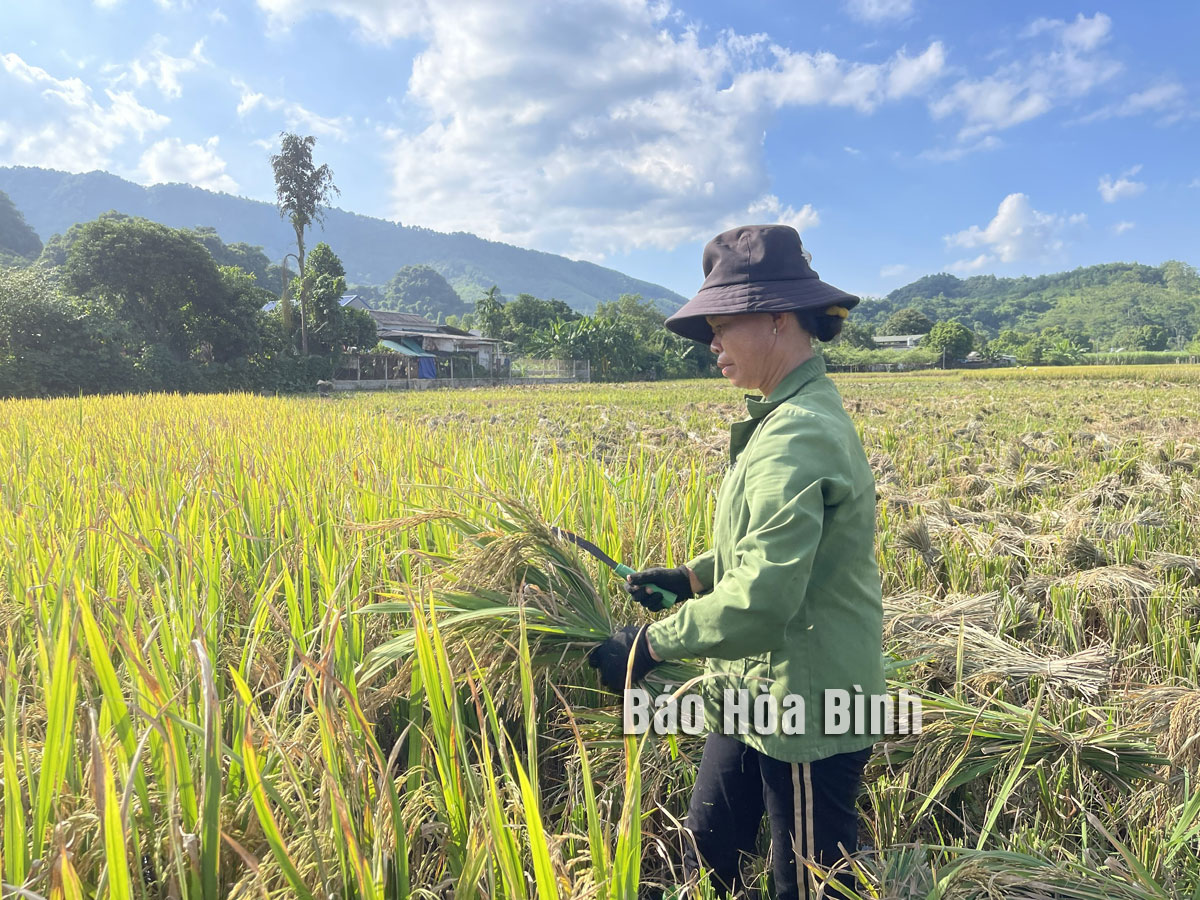
Defining socio-economic development and effective implementation of policies on ethnic affairs in the locality has been a continuous and crucial task during 2019-2024 period, the Party Committee and People's Committee of Cao Phong district have focused on leadership in executing these tasks, achieving positive results. The material and spiritual lives of people in ethnic minority-inhabited and mountainous areas have gradually improved while rural area has gained a face-lift.
Thanks to investment in transport and irrigation systems, farmers in Cao Phong district’s Tay Phong commune feel secure in agricultural production, contributing to ensure food security.
By the end of 2023, eight communes in the district were recognised as meeting standards of new-style rural areas. This year, Thach Yen commune is expected to become the last commune to achieve the title, striving to be removed from the list of extremely difficult areas.
Bui Van Tuong, Vice Chairman of the Thach Yen People's Committee, said that last year, the commune satisfied 15 out of 19 criteria of new-style rural areas and has been making efforts to fulfil the remaining criteria, namely income, housing for residents, cultural facilities, and poverty rate.
The commune will continue to mobilise and integrate resources from the National Target Programmes (NTP) to accelerate the fulfillment of all criteria, contributing to the goal of making Cao Phong a new rural district in line with the resolution of the district's Party Congress for the 2020-2025 term.
With 11.6 billion VND (466 million USD) funding from the NTP, the district repaired and built 94 water supplying facilities, rural roads and markets. Particularly, it mobilised 386.3 trillion VND to pour in commune rural road infrastructures, irrigation projects and schools, thus contributing to promoting socio-economic development.
Due attention has been paid to the preservation and promotion of traditional cultural values of ethnic minorities. Currently, the district is home to three national relic sites. All hamlets and communes in the district have cultural houses and art troupes.
The effective implementation of supporting programmes, policies and projects for ethnic minority-inhabited and mountainous areas has led to significant changes. The district’s socio-economic development continues to make progress, with breakthroughs in some sectors. Its GDP economic growth rate reached 9.2% last year.
Eight out of 10 communes in the district met new-style rural standards. The poverty rate declined to 4.81% last year and income per capita reached 59 million VND per year, a rise of 9.5 million VND compared to 2019. The countryside has gained a face-lift while political security and social order and safety have been maintained.
Bui Hoai Nhi, Vice Chairwoman of the People's Committee of Cao Phong district, attributed the achievements gained over the past five years to the active engagement of ethnic minorities in building a strong political system and consolidating the national solidarity. Reputable people have actively participated in communication work, calling on people to comply with the Party's directions and policies, and the State's laws.
In the coming time, the district will continue to prioritise investment in socio-economic development of ethnic minority-inhabited and mountainous areas in accordance with the district's development orientation scheme and the resolutions of Party Congresses at all levels.
With the determination to realise poverty reduction goals and become a new rural district, Cao Phong will strive to reduce the poverty rate in ethnic minority-inhabited areas by at least 3% and the average income of residents there equivalent to half of the national average, he added.
The Department of Education and Training of Hoa Binh province held a conference on March 18 to review the performance of the "Safe and Happy School" Project and set out tasks for 2025. The project, funded by the Taiwan Fund for Children and Families (TFCF), aims to create a safe, inclusive, and supportive learning environment for students. The event saw the attendance of representatives from the TFCF and 26 beneficiary schools.
With over 70% of their workers being women, trade unions across industrial parks (IPs) in Hoa Binh have been actively safeguarding their legal rights and interests while implementing initiatives to improve their income and well-being.
In recent years, the Hoa Binh provincial General Hospital has continuously innovated itself and improved the quality of medical services to meet the increasing needs of local people. With substantial investments in infrastructure and modern equipment, along with a team of highly qualified doctors and nurses, the hospital has gradually established itself as one of the leading medical units in the Northwestern region and a trusted destination for healthcare for people inside and outside the province.
From mastering the fundamentals of programming to achieving national recognition, the Programming Club of the Le Van Tam Primary School (STAR LVT28) in Hoa Binh city has made remarkable strides in the field of robotics.
The Ho Chi Minh Communist Youth Union Committee and the Vietnam Youth Federation chapter of Hoa Binh province organised a programme on March 12 to launch the "Digital Literacy" movement and an online quiz on the resolutions of the Vietnam Youth Federation congresses at all levels, as well as the Politburo's Resolution No. 57-NQ/TW on breakthroughs in the development of science, technology, innovation, and national digital transformation.
As climate change grows more unpredictable, the development of production forests has become essential - not just for economic growth, but for safeguarding the environment and maintaining ecosystem balance. By boosting local incomes, curbing natural disasters, preventing soil erosion, and protecting water resources, these forests play a crucial role in sustainable development.



